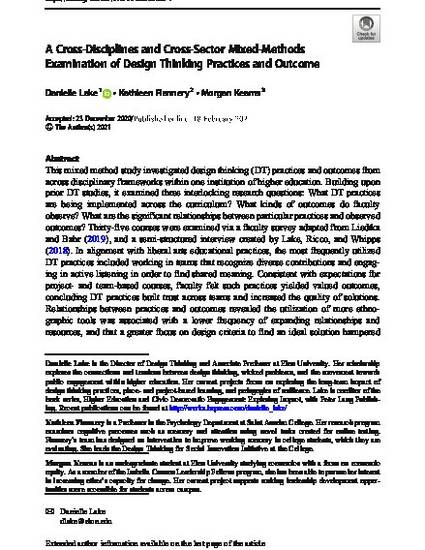
Article
A Cross-Disciplines and Cross-Sector Mixed-Methods Examination of Design Thinking Practices and Outcome
Innovative Higher Education
(2021)
Abstract
This mixed method study investigated design thinking (DT) practices and outcomes from across disciplinary frameworks within one institution of higher education. Building upon prior DT studies, it examined three interlocking research questions: What DT practices are being implemented across the curriculum? What kinds of outcomes do faculty observe? What are the significant relationships between particular practices and observed outcomes? Thirty-five courses were examined via a faculty survey adapted from Liedtka and Bahr (2019), and a semi-structured interview created by Lake, Ricco, and Whipps (2018). In alignment with liberal arts educational practices, the most frequently utilized DT practices included working in teams that recognize diverse contributions and engag- ing in active listening in order to find shared meaning. Consistent with expectations for project- and team-based courses, faculty felt such practices yielded valued outcomes, concluding DT practices built trust across teams and increased the quality of solutions. Relationships between practices and outcomes revealed the utilization of more ethno- graphic tools was associated with a lower frequency of expanding relationships and resources, and that a greater focus on design criteria to find an ideal solution hampered efforts towards trust building. These findings suggest DT requires time and trust which can be constrained by the imposed deadlines of semester-based projects. The survey and interviews pointed to both similarities and differences between disciplines in DT prac- tices. Future research investigating design thinking pedagogy should include faculty, students, and stakeholders with multiple touchpoints for assessment to identify learning experiences that build change-making capacities and yield genuinely valuable and viable real world projects.
Thus far research on design thinking (DT) has mostly emerged from limited qualitative case studies (Calgrenet al., 2016; Lake et al., 2019) and traditional return on investment numbers (Forrester Research Inc., 2018; Sheppard et al., 2018). While prior research on DT practices and outcomes from the business, non-profit, and government sector has shown that moderate engagement with core DT practices increased valued outcomes and practitioner flexibility (Liedtka & Bahr, 2019), researchers have not yet examined if similar practices and outcomes can be seen within higher education pedagogies. Efforts to critically interrogate the role of narrowly constructed frameworks and practices in academia are still needed. Responding to current research findings (Brodie, 2014; Vink, 2019), this study explores what DT practices might be most effective for generating change and building capacities. It also highlights various approaches and perceived outcomes across disciplinary frameworks, exploring the potential merits and drawbacks of DT practices.
This paper summarizes the design and findings from a mixed methods study that investi- gated DT practices and outcomes from across disciplinary frameworks and compares findings from higher education to those emerging in other sectors. Building upon prior DT studies (Lake et al., 2019; Liedtka, 2017; Liedtka & Bahr, 2019) and studies examining high impact practices within higher education (Lake et al., 2018), it was designed to address three interlocking research questions:
- What DT practices are being implemented across the curriculum?
- What kinds of outcomes do faculty observe?
- What, if any, are the significant relationships between particular practices and observed outcomes?
This research included the adaptation of a previously validated survey by Liedtka and Bahr (2019) assessing DT practices and outcomes, and semi-structured interviews. This study assessed practices and outcomes across 35 courses and programs integrating DT practices and compared findings to prior research (Liedtka & Bahr, 2019).
Keywords
- Design Thinking,
- Team and Project-based learning,
- High impact practices,
- Interdisciplinarity,
- Mixed model design,
- Experiential learning
Disciplines
Publication Date
Winter February 18, 2021
DOI
10.1007/s10755-020-09539-1
Citation Information
Danielle Lake. "A Cross-Disciplines and Cross-Sector Mixed-Methods Examination of Design Thinking Practices and Outcome" Innovative Higher Education (2021) Available at: http://works.bepress.com/danielle_lake/74/
